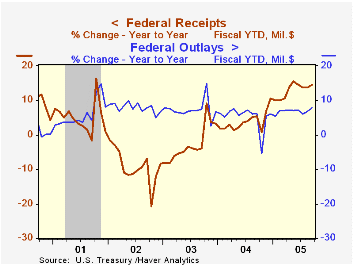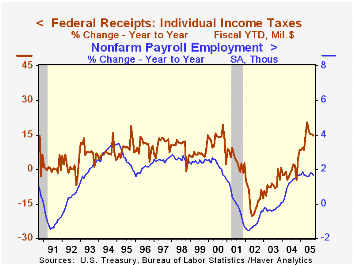 Global| Oct 17 2005
Global| Oct 17 2005FY 2005 U.S. Budget Deficit Fell Due To Higher Receipts
by:Tom Moeller
|in:Economy in Brief
Summary
The U.S. federal government ran a budget deficit of $318.6B during FY05, down nearly one quarter from the record deficit of $412.1B during the prior fiscal year.As a percentage of GDP, the deficit fell to 2.6% from 3.6% in FY04. Net [...]

The U.S. federal government ran a budget deficit of $318.6B during FY05, down nearly one quarter from the record deficit of $412.1B during the prior fiscal year.As a percentage of GDP, the deficit fell to 2.6% from 3.6% in FY04.
Net receipt growth of 14.6% during FY05 was capped by a 62.5% m/m spike in September. That gain was led by a 31.6% m/m rise in individual income taxes (44% of total receipts) which followed an 18.3% August increase. For the fiscal year, the 14.6% rise in individual income taxes was the strongest since 1981.
Corporate income taxes (10% of total receipts) also reflected the improved economy and spiked higher in September. The 47.0% y/y gain during FY05 was the strongest since 1952 and followed a 43.7% jump the prior year. 
The improved job market raised employment taxes (36% of total receipts) 8.8% y/y during all of FY 2005, the strongest increase since 1988.
U.S. net outlays grew 7.9% during FY05. Federal outlays on defense (19% of total outlays) continued to surge but the 8.3% gain during FY05 actually was down from 12.8% growth during FY04 and from 15.9% during FY 03. Medicare spending (12% of total outlays) surged during the last two months and lifted FY05 growth to 10.9%, the strongest since 1992. Spending on social security (21% of total outlays) fell in September and the decline limited the increase during FY 05 to a still high 5.6%. Spending on health programs (10% of the total) rose 4.3% during FY05 while spending on education & training (4% of the total) surged 11.3%. interest expense (8% of the total) grew 14.9% with higher interest rates versus a modest rise last year and declines during the prior six fiscal years.
Do Budget Deficits Cause Inflation? from the Federal Reserve Bank of Philadelphia can be found here.
| US Government Finance | Sept | Aug | FY 2005 | FY2004 | FY2003 | FY2002 |
|---|---|---|---|---|---|---|
| Budget Balance | $35.8B | $-51.6B | $-318.6B | $-412.1B | $-377.6B | $-157.8B |
| Net Revenues | $252.6B | $155.4B | 14.6% | 5.5% | -3.8% | -6.9% |
| Net Outlays | $216.8B | $207.0B | 7.9% | 6.2% | 7.4% | 7.9% |
Tom Moeller
AuthorMore in Author Profile »Prior to joining Haver Analytics in 2000, Mr. Moeller worked as the Economist at Chancellor Capital Management from 1985 to 1999. There, he developed comprehensive economic forecasts and interpreted economic data for equity and fixed income portfolio managers. Also at Chancellor, Mr. Moeller worked as an equity analyst and was responsible for researching and rating companies in the economically sensitive automobile and housing industries for investment in Chancellor’s equity portfolio. Prior to joining Chancellor, Mr. Moeller was an Economist at Citibank from 1979 to 1984. He also analyzed pricing behavior in the metals industry for the Council on Wage and Price Stability in Washington, D.C. In 1999, Mr. Moeller received the award for most accurate forecast from the Forecasters' Club of New York. From 1990 to 1992 he was President of the New York Association for Business Economists. Mr. Moeller earned an M.B.A. in Finance from Fordham University, where he graduated in 1987. He holds a Bachelor of Arts in Economics from George Washington University.
More Economy in Brief
 Global| Feb 05 2026
Global| Feb 05 2026Charts of the Week: Balanced Policy, Resilient Data and AI Narratives
by:Andrew Cates






